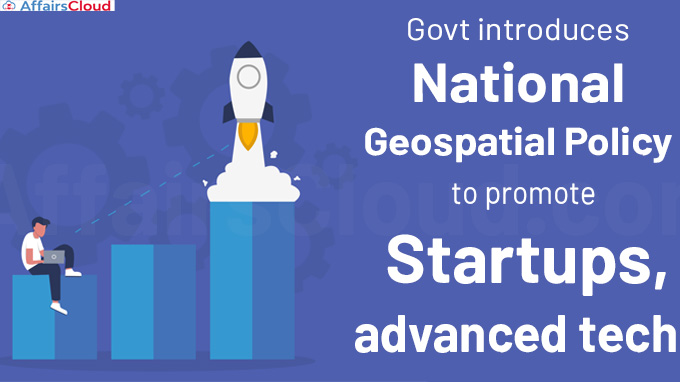 On 28th December 2022, the Ministry of Science and Technology (MoS&T) notified the ‘National Geospatial Policy, 2022’ for implementation with immediate effect. The policy was notified following the liberalising of the usage of geospatial data under the draft Geospatial Data Policy in February 2021.
On 28th December 2022, the Ministry of Science and Technology (MoS&T) notified the ‘National Geospatial Policy, 2022’ for implementation with immediate effect. The policy was notified following the liberalising of the usage of geospatial data under the draft Geospatial Data Policy in February 2021.
- The Government of India (GoI) has now defined a 13-year guideline for the growth of India’s geospatial data industry, including the creation of a national framework for using geospatial data to improve citizen services and other initiatives.
The Union Cabinet approved the National Geospatial Policy 2022 during its meeting held on December 16, 2022.
Note: The word Geospatial means “consisting of, derived from, or relating to data that is directly linked to specific geographical locations”.
National Geospatial Policy 2022
i.The National Geospatial Policy, 2022 is a citizen-focused policy that aims to strengthen the geospatial sector to support national development, economic prosperity, and a growing information economy.
ii.The policy relies on the favourable environment created by the “Guidelines for Acquiring and Producing Geospatial Data and Geospatial Data Services, Including Maps,” released by the Department of Science and Technology (DST), MoS&T, and GoI.
iii.The policy seeks to build high-resolution topographical survey and mapping, as well as a high-accuracy digital elevation model for India by 2030, in addition to developing geospatial infrastructures, skills and knowledge, standards, and businesses.
Key Highlights of the National Geospatial Policy 2022
i.The policy would strive to create a national geospatial data framework and promote “easy availability” of data to businesses and the general public.
ii.The GoI will endeavour to establish a regulatory framework by 2025 that “supports liberalization of the geospatial sector and democratization of data for improved commercialization with value-added services.”
- By 2025, the GoI intends to improve the availability and accessibility of “better location data” for companies, including private organizations.
iii.The GoI proposes to establish an “Integrated Data and Information Framework” (IDIF) under which a “Geospatial Knowledge Infrastructure” (GKI) will be developed by 2030.
- The mapping of subsurface infrastructure in major cities and towns across India will be one of the objectives of geospatial data use by 2035.
iv.The policy also calls for the establishment of a national apex body, the Geospatial Data Promotion and Development Committee (GDPDC).
- The GDPDC will provide specifics on the use of geospatial data in governance across certain ministries, and also facilitate the creation of private startups and firms to work on specific projects.
v.Additionally, it would encourage the utilization of the “National Digital Twin,” a high-resolution data ecosystem that promotes connected digital twins among private firms “with secure and interoperable data sharing.”
vi.The policy describes the creation of 14 National Fundamental Sectoral Geospatial Data Themes.
- The themes will be applied to a range of sectors that support the creation of commercial geospatial applications, such as forestry, mining, and disaster management.
Indian & Global Geospatial Markets
i.According to Union Minister of State (Independent Charge) Dr. Jitendra Singh, MoS&T, India’s geospatial economy is expected to surpass Rs. 63,000 crores by 2025, growing at a rate of 12.8%.
- It will support more than 10 lakh jobs, the bulk of which are held by geospatial startups.
ii.He also indicated in his address to the second United Nations World Geospatial Information Congress (UN-WGIC) that there were roughly 250 geospatial startups in India, during the current boom of technology-driven firms.
iii.The GoI has established a geospatial incubator to boost the sector.
iv.Globally, the geospatial market is valued at approximately USD 17 billion, whereas the space economy is valued at approximately USD 55 billion.
Note: Esri India is a provider of end-to-end Geographic Information Systems (GIS) solutions that has assisted numerous departments in creating mapping and geospatial infrastructure.
Recent Related News:
On November 10, 2022, the Union Minister of State (Independent Charge), Dr. Jitendra Singh, MoS&T, dedicated the nation ‘Indian Biological Data Center’ (IBDC) at Regional Centre of Biotechnology (RCB), Faridabad, Haryana. It is India’s first national repository for life science data which is supported by the Department of Biotechnology (DBT), MoS&T.
About the Ministry of Science and Technology (MoS&T):
Minister of State (Independent Charge) – Dr. Jitendra Singh (Udhampur Constituency – Jammu and Kashmir)
Departments under MoS&T – Department of Biotechnology; Department of Science and Technology (DST) & Department of Scientific and Industrial Research (DSIR)




